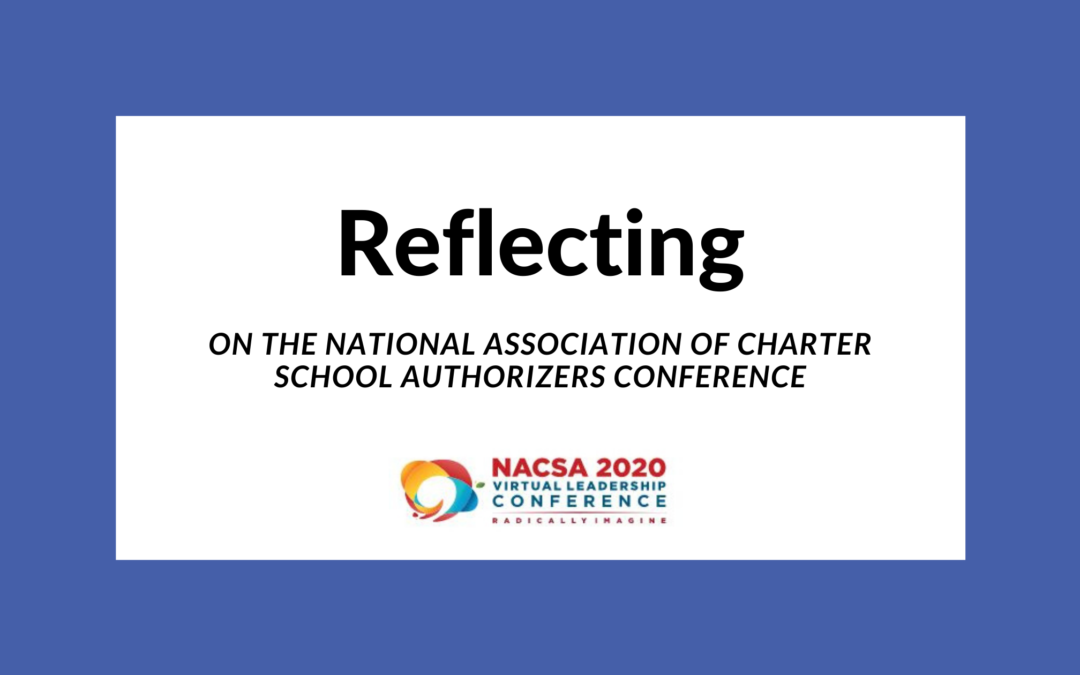Each year, CSI staff members participate in the National Association of Charter School Authorizers (NACSA) Conference as both learners and presenters. This year was the same but, of course, things looked a bit different: the conference was held virtually and took place over three weeks instead of a few days.
This year, CSI staff were involved with four sessions at the virtual NACSA conference:
1. Meeting Schools Where They Are: Reflecting on Equity initiatives at CSI
Description: There is no magic formula to improving equity and access in charter schools. This session provided an overview of the equity initiatives that the Colorado Charter School Institute has implemented over the past 4 years and shared reflections on promising practices and areas for improvement. Participants learned about structures and strategies to begin your own equity initiatives that meet schools where they are, provide support, and build relationships.
Clare Vickland, Director of Student Services, Colorado Charter School Institute; Ryan Marks, Director of Evaluation and Assessment, Colorado Charter School Institute
2. Redesigning Accountability: Supporting a Diverse Charter Sector
Description: Encouraging new and innovative charter school models requires authorizers to rethink traditional accountability structures. Several authorizers shared lessons learned as they expanded the definition of school quality and imagined a new accountability ecosystem.
Facilitator
- Bellwether Education Partners – Ashley LiBetti, Associate Partner
Panelists
- DC Public Charter School Board – Erin Kupferberg, Senior Manager of the Financial and Academic Quality
- Georgia State Charter School Commission – Katie Manthey, Director of Research & Evaluation
- Colorado Charter School Institute – Ryan Marks, Director of Evaluation and Assessment
- State University of New York Charter School Institute – Susie Miller Carello, Executive Director
3. Tiered Logic: Increasing Efficacy of Authorizer-School Interactions
Description: The model of tiered supports can be applied to efficiently guide authorizer effort towards helping schools meet authorizer expectations. Applicable to a wide range of authorizer practices – including compliance monitoring, program support, and submissions – tiered supports can be layered to provide more directed support precisely how and where they are most effective. Generalized strategies were shared in addition to results and lessons learned from a case study involving school enrollment data submissions.
Greg Nusz, Program Evaluation Specialist, Colorado Charter School Institute
4. Community-Responsive Authorizing
Description: As each of us has grappled with our role as an authorizer during the pandemic, one outcome has been increased clarity and purpose in our work and in the expectations we set for our schools and our own staff. Participants learned about the Colorado Charter School Institute’s community-responsive approach to authorizing: how our schools and our staff have responded to this framework, its challenges and successes, and what this may look like post-COVID.
Dr. Terry Croy Lewis, Executive Director, Colorado Charter School Institute; Janet Dinnen, Chief of Staff, Colorado Charter School Institute
While there were diverse and varied topics, the conference overall focused on a few common themes. Notably, “community-centered authorizing” was a central theme throughout the conference. At the onset of the pandemic, NACSA called for “authorizing to be more responsive to the needs of communities – to listen to what students, families, and educators need and to act boldly even if that meant doing things outside of traditional authorizing activities”. My participation in NACSA meetings served as an impetus for thinking about how CSI was responding to and approaching authorizing during the pandemic. Janet and I discussed how “community responsive authorizing” provided a valuable framework that captured CSI’s approach to authorizing. Subsequently, we worked with the Leadership Team and CSI Board to refine this framework.
Equity was also a topic at the forefront of people’s minds. Clare Vickland and Ryan Marks shared reflections on equity initiatives happening here at CSI, which continue to evolve. Other sessions included “Innovating for Equity” and “Becoming an Anti-Racist Authorizer”. Earlier this year, the CSI Board made a Commitment to Equity, so these sessions were especially relevant.
At CSI, we are called to be a “model authorizer”. This means we are committed to evaluating our work and seeking feedback as well as sharing our knowledge and expertise with others. As part of this model authorizing work, Clare Vickland and Ryan Marks contributed a chapter to a recently published book. The title of the book is Challenges to Integrating Diversity, Equity, and Inclusion Programs in Organizations and their chapter is titled Expanding Equity and Access in State Authorized Charter Schools.
We will continue to collaborate with authorizers across the country on best practices as we approach community-responsive authorizing.

